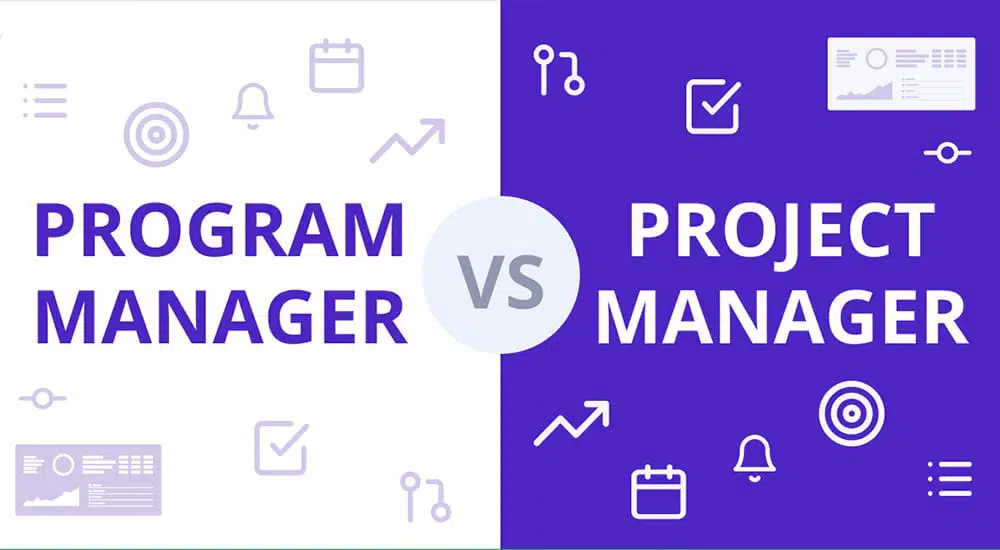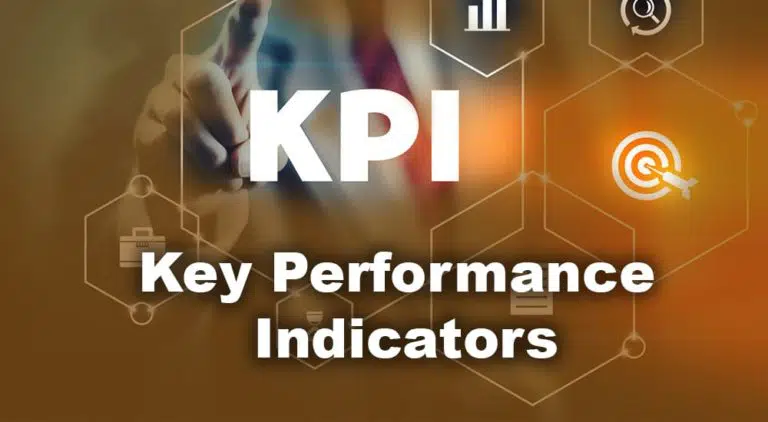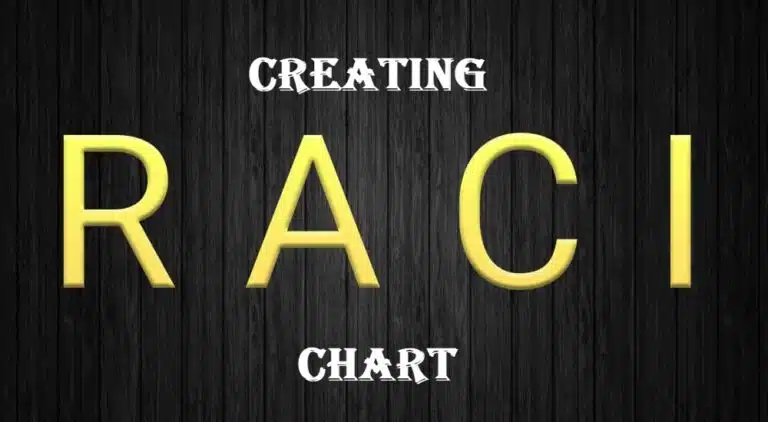Many professionals fail to differentiate the roles of project manager and program manager and use them interchangeably.
Both roles are essential for an organization dealing with similar projects and are different but complement each other. Therefore, it is vital to understand the differences between the two positions, i.e., program manager vs project manager.
In this blog post, we will explore the role of a project manager and a program manager and how they differ.
However, before discussing the roles of these two titles, let’s understand projects and programs.
According to the PMBOK Guide, a project is a temporary endeavor to create a unique product, service, or result.
A program manages more than one similar project under a single umbrella for better management and more efficient resource utilization.
Projects and programs are key to organizational success and serve different objectives.
The difference between projects and programs are as follows:
- Projects are temporary and have a defined beginning and end, while programs have a longer duration.
- Projects involve a team of people who work together to complete the project. On the other hand, programs have project managers and some supporting staff.
- Projects require more resources than programs.
- Projects are more complex than programs.
- Projects generally have a higher risk than programs. Programs are typically less risky than projects.
- Organizations initiate projects in response to a specific problem or opportunity. They initiate programs for strategic purposes.
Program Manager Vs Project Manager
Now we will discuss the difference between the program manager and the project manager.
Program Manager
A program manager coordinates multiple similar projects and oversees various aspects of a program.
They are responsible for developing the program plan, coordinating resources, and ensuring the program meets its objectives.
Program managers require a diverse skill set because of their wide range of responsibilities. They must possess strong communication, problem-solving, and organizational skills and the ability to manage people and resources. In addition, program managers deal with multiple tasks among different projects simultaneously.
Project Manager
A project manager is responsible for managing projects. This includes developing a project management plan, executing it, monitoring and controlling it, and closing it.
Project managers usually have a background in engineering or business administration.
Project managers must possess strong leadership skills to motivate team members to meet deadlines. They must handle conflicts and make decisions in the project’s best interest. In addition, they should communicate with project team members and management effectively.
Project management is a challenging but rewarding career. It can be a fulfilling profession if an individual possesses the necessary skills.
Roles and Responsibilities for Program and Project Manager
The roles of a program manager include:
- Defining the program and its objectives.
- Developing a plan to achieve those objectives.
- Managing the resources among the project under the program.
- Ensuring that the program meets its targets.
- Coordinating the activities of all participants in the program.
- Reporting on progress and ensuring that they captured lessons learned.
The roles of a project manager include:
- Developing a project plan.
- Hiring team members.
- Assigning tasks to team members.
- Creating schedules.
- Monitoring the progress of the project.
- Make changes to the project plan as needed.
- Ensuring that the project is completed on time and within budget.
- Reporting to the program manager.
Differences Between Program Managers and Project Managers
- Program managers are responsible for managing a program consisting of multiple similar projects. In contrast, project managers are responsible for managing individual projects.
- Program managers have a more strategic focus, while project managers have a more tactical focus. Program managers have a big-picture focus, while project managers focus on the details.
- Program managers are responsible for developing the program plan and coordinating resources among different projects. Project managers are responsible for planning, executing, and monitoring the project.
- Program managers manage projects and resources among projects. Project managers manage projects and influence factors causing changes.
- Program managers are often in managerial roles, while project managers are in technical roles and work under program managers.
- Program managers have more authority than project managers.
- Program managers work with projects for a longer timeline, while project managers typically work with shorter ones.
Examples of Job Positions for Project Manager Vs Program Manager
Project Manager Positions
Examples of project management positions and their responsibilities are below.
Project Manager for Software Development
Project managers for software and web development coordinate and manage software and web development projects.
Here are some of their responsibilities:
- Defining software characteristics with developers and clients.
- Budgeting and allocating funds for software development initiatives.
- Handling software testing, troubleshooting, and evaluation throughout the development phase.
Technical Project Managers
These project managers oversee the implementation of IT or technology projects.
Their responsibilities include the following:
- Come up with solutions to technical challenges and assess hazards.
- Managing the purchase of project materials and negotiating rates with suppliers.
- Leveraging their technical skills to create project plans that align with the company’s objectives.
Program Manager Positions
Examples of program management positions and their responsibilities are below.
Manager of Human Resources
A human resource (HR) program manager’s responsibilities include:
- Creating job classification specifications.
- HR training program design.
- Analyzing HR trends to create and adjust program objectives.
- Creating and modifying human resources policies and procedures.
IT Program Manager
The information technology (IT) program manager job entails collaborating across departments to resolve IT difficulties.
The following are some of their responsibilities:
- Guiding IT management policies and practices.
- Examining IT operations to evaluate the needs of the information system.
- Advising top management on strategies for integrating applications within the organization.
Skills for Program Manager Vs Project Manager
The skills required for a program or project management career are almost similar. Below are the key skills needed for the program manager and project manager roles.
Skills for Program Manager
- Strategic Thinking: A program manager sees the big picture and understands how the various parts of the program fit together. They need to think ahead and develop plans to achieve the desired results.
- Strong Communication Skills: A program manager needs to communicate effectively with all stakeholders, including executives, project managers, and top management. They need to articulate complex ideas clearly and concisely.
- Organizational Skills: A program manager manages multiple projects and tasks. They need to have excellent time management skills and stay controlled under pressure.
- Resource Management: A program manager needs to manage resources and time effectively.
- Analytical Skills: A program manager needs to analyze data and make informed decisions. They need to understand the implications of their decisions and how they will impact the program.
Skills for Project Manager
- Technical Expertise: A project manager must understand the technical aspects of the project. They must troubleshoot problems and make decisions to keep the project on track.
- Leadership: The project manager must motivate and inspire team members to perform well. They need to build consensus and make tough decisions.
- Change Management: A project manager must influence the factors causing changes in the project.
- Communication Skills: A project manager needs to communicate effectively with all stakeholders, including executives, management, and suppliers. They should keep everyone up-to-date on the latest developments.
- Project Management Skills: A project manager must understand project management principles. They must plan, execute, and monitor projects.
Certifications for Program Manager and Project Manager
There are a few different certifications that program and project managers can pursue, depending on their interests and goals.
Certifications for Program Manager
- Program Management Professional (PgMP)
- Certified ScrumMaster (CSM)
Certifications for Project Manager
- Project Management Professional (PMP)
- Certified ScrumMaster (CSM)
- Lean Six Sigma Green Belt (LSSGB)
The details of the above certifications are as follows:
- CAPM: Certified Associate in Project Management (CAPM) is for individuals who want to work in project management as an entry-level position. The Project Management Institute (PMI), USA, issues this certification.
- PMP: The Project Management Professional (PMP) is the most widely held project management qualification worldwide. The Project Management Institute oversees administering the PMP.
- PgMP: The Program Management Professional (PgMP) certification is for program management professionals. This advanced certification demonstrates mastery of the skills needed for a successful career in program management. The PMI issues this certification.
- Scrum Master Certificates: The most common scrum master certifications are Certified ScrumMaster (CSM) and Professional Scrum Master (PSM I).
- Lean Six Sigma Green Belt (LSSGB): The LSSGB is a certification for project managers who want to apply Lean and Six Sigma techniques to their projects.
- Google Project Management Professional Certificate: This six-month (or shorter) certificate program accessible on Coursera helps individuals prepare for entry-level project management roles.
Conclusion
Program manager and project manager roles have many similarities, but the key distinctions are their focus and responsibilities. For example, a program manager has a broader view of an organization’s goals and objectives. In contrast, a project manager focuses on delivering specific projects that support those goals.
Project managers are responsible for ensuring that individual projects meet specific deadlines and requirements, whereas program managers are responsible for meeting the collective goals of all projects under a program.
This is where this post on program manager vs project manager ends.

I am Mohammad Fahad Usmani, B.E. PMP, PMI-RMP. I have been blogging on project management topics since 2011. To date, thousands of professionals have passed the PMP exam using my resources.








Thanks for the explanation about these two positions . Since I was preparing for my PMP exam when a concept was not clear I came to your site to get an alternative explanation and yours has been always pretty easy to understand and retain.
You’ve been helpful in the pm sector , keep up the good work
You’ve been help in the pm sector , keep up the good work